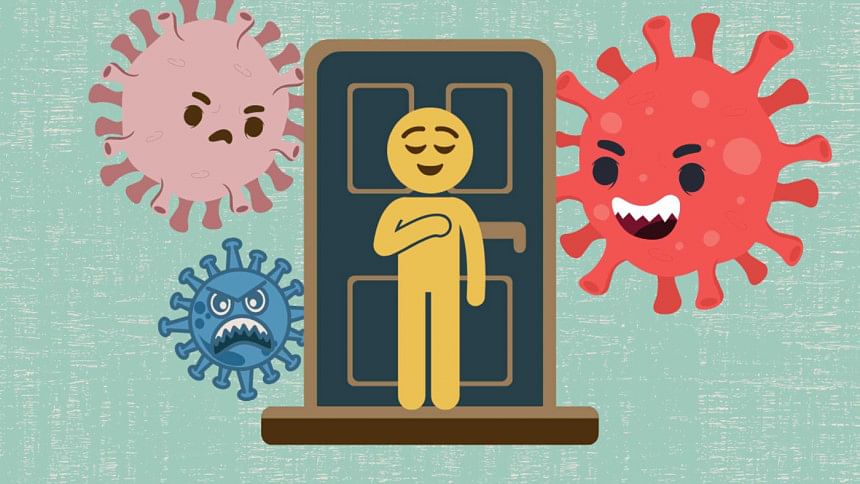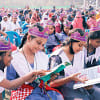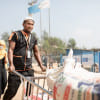We can’t let our guard down against Covid

With Covid-19 cases receding worldwide, our lives are entering a new phase, where the "normal" perhaps means a strategic co-existence with an ever-present, maleficent viral disease. The novel coronavirus, unfortunately, is highly unpredictable, with new variants and mutations surfacing every now and then, at times wreaking havoc on communities.
Take the case of China, for example. Despite pursuing a strict zero-Covid policy the last couple of years, the country is struggling to fight off new outbreaks of the Omicron variant, imposing blanket lockdowns in multiple localities, including the entirety of Shanghai (a city of around 27 million people), Beijing and Shenzhen, along with other major cities.
One of the variants found in the city of Suzhou near Shanghai—although mild in nature—does not match with records in the global variant database. The emergence of the Omicron sub-variant XE—a blend of Omicron BA.1 and BA.2 strains, also termed "recombinant"—first detected in the UK, and later found in India and even Thailand, has also drawn the attention of medical communities around the world. This new sub-variant—currently the UK's dominant one, with more than 637 cases detected so far—is thought to be highly transmissible, with early estimates indicating a 10 percent community growth rate advantage in comparison to the fast-spreading BA.2 strain. However, as of yet, there has been no indication suggesting that the XE sub-variant could be deadly. The events of the next few weeks would be important in understanding the nature and strength of the new sub-variant. While there is no need for us to panic, as conscious citizens, we should stay alert and follow the safety protocols.
And with Covid evolving, new strains and variants are expected to surface in the coming months and years. Which means, in the long run, Covid is expected to transform into an endemic disease. This, however, does not negate the risk posed by the virus. For some, especially the elderly and children, and for those who have not been vaccinated, the risks would be higher.
For us in Bangladesh, with the economy gradually opening up and life reflecting a semblance of normalcy, it is important that we do not let our guard down. Unfortunately, the number of people who practise social distancing or follow personal hygiene protocols is only decreasing by the day. Not only in open spaces, but in cramped places like lifts, people are moving freely without a mask, exposing themselves and the others to the menacing possibility of catching the stealthy virus.
While the falling number of Covid cases and subsequent low fatality rate is a blessing and a respite for us from the nightmare that we have had to endure over the last two years—losing lives and livelihoods—we cannot become complacent now. The government has done a commendable job of bringing in as many people as they could under the Covid-19 immunisation programme, but we still have to keep in mind that there are Covid variants that have the capacity to evade vaccine protection and infect individuals. And with Covid, one can never really be sure how and when one might catch the virus.
For us, the only way to dodge the risk of catching Covid-19 is by adhering to health and safety guidelines, such as social distancing—following the space slots marked in lifts, public places, counters, etc that we often look down upon so disdainfully—and strictly maintaining personal hygiene protocols, including wearing face masks when in public, among other prescribed measures.
We must also keep in mind that most children in our country are yet to receive their first shot of the vaccine. And they have only recently started attending schools in person after a struggle with online classes and subsequent learning loss of almost two years.
A Unicef report suggested that the education of 37 million children in Bangladesh had been disrupted by the protracted closure of schools due to the pandemic. Moreover, 14,111 privately-run primary schools had to face closure within one year of the pandemic's outbreak in the country. The number of teachers and students declined by 83,268 and 1,461,634, respectively, within the same time frame, as per the Annual Primary School Census (APSC) 2021, prepared by the Directorate of Primary Education, and this figure is excluding the English medium schools or the Qawmi madrasas. The sheer numbers point to the heavy toll the pandemic has taken on our education sector.
While it would take years to recoup this loss, we must make sure to keep the spread of Covid to a minimum, if our children are to continue in-person classes. One more outbreak, and our children would be back within the confines of home amid uncertainties, fighting a fresh emotional and logistical battle to adapt to and cope with online learning.
The same is applicable for our economic aspirations as well. After months of struggles and setbacks, the economy is finally reopening, trying to cover up for the losses of the last two years. And the forecasts so far have been encouraging. The World Bank, in its Global Economic Prospects report, in January 2022, suggested that Bangladesh's economic growth would reach as high as 6.4 percent in FY2021-22, and up to 6.9 percent in FY23, despite the deceleration of the global economy.
Rebound of the garments industry, along with strong remittance inflow and increase in demand in the domestic market are thought to be the key drivers behind this growth. However, to sustain this, we would need to ensure that this flow of economic activities remains uninterrupted and we can only do so by keeping the coronavirus at bay. If we become complacent thinking we have managed to wash our hands of the virus once and for all, we would be making a grave mistake.
Despite all the strict measures taken by China, the country is now scrambling to minimise new outbreaks of the virus, and the new lockdown measures are expected to take a toll on the country's economic growth.
While the situation in every country is different, we should not take this lull in the Covid scenario in our country for granted. The more careful we are, the safer our nation is, and the more protected our loved ones are. We are all responsible for the fight against Covid, and we must not fail ourselves in this.
Tasneem Tayeb is a columnist for The Daily Star. Her Twitter handle is @tasneem_tayeb

 For all latest news, follow The Daily Star's Google News channel.
For all latest news, follow The Daily Star's Google News channel. 








Comments